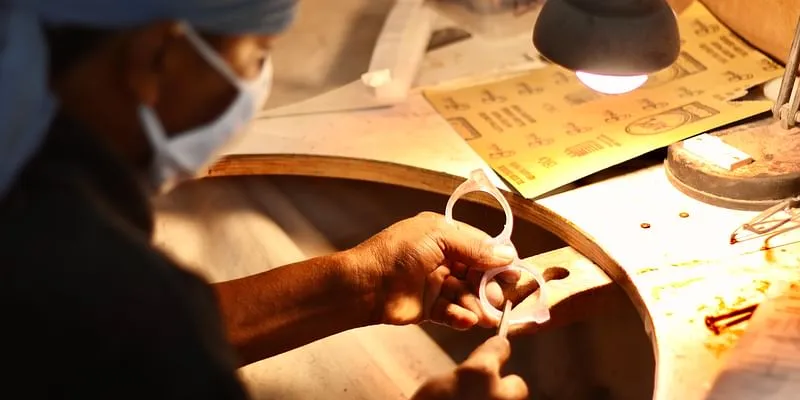For this Goa-based eyewear brand, sustainability is its top priority
Goa-based eyewear brand Coco Leni is helmed by Arjun Sagar and Matthias Haase. The brand is including sustainability in a market dominated by plastic frames.
Millennials are becoming increasingly conscious about their lives, especially what they wear.
This trend has helped in raising awareness around sustainable living and adopting environment-friendly options, not just among consumers but also brands and businesses.
While there are numerous sustainable skincare and apparel brands, it is not very common to find sustainable eyewear brands in India.
And, Goa-based Coco Leni wants to make a dent in this market. The brand — started by Arjun Sagar and Matthias Haase — makes stylish eyewear out of sustainable raw materials, including wood, bamboo, buffalo horn, and Italian acetate, among others. The frames cost between Rs 7500 - Rs 19,500.
Arjun — an optician since 2005 — realised that sustainability was not followed by several eyewear companies.
This is true for both plastic frames and contact lenses. According to a study by Arizona State University, 45 million Americans flush their contact lenses, which produces about 23 tonnes of plastic waste annually.
Therefore, Arjun started looking for solutions that could bring the eyewear industry on the path of sustainability. He encountered Matthias — a Germany-based workshop technician and optometrist — who was working with an Annaberg Buchholz-based eyewear company that has been making sustainable eyewear frames since 1946.
Arjun worked with Matthias and bought the company. They rebranded it as Coco Leni in 2013, and in 2015, they decided to shift the base from Germany to Goa for “personal and economic reasons.”
“I wasn’t very happy living in Germany away from my family. Also, we wanted to start our journey afresh. India not being a very matured market looked ideal,” says Arjun.

A local brand
While numerous international players, including Eco, Pala, Wood Zee, etc., are operating in the space, it is hard to find a made in India brand.
Coco Leni, according to Arjun, stands out for two things — its customisation approach and the environment factor.
“Most of the bigger brands produce frames in bulk. This doesn’t make sense to us. First, because you are leaving a lot of carbon footprint behind, and second, you can’t expect all your customers to buy the same thing,” he adds.
Additionally, having its own workshop gives the brand the flexibility and freedom to experiment. “We customise based on face shape, size, colours, choice of the person, etc.,” he shares.
Arjun calls Coco Leni’s Goa manufacturing facility — which he started from scratch — a “self-sustaining unit,” which doesn’t import any raw materials or products.
He points out that the only difference between the Indian and German markets is the expertise in the eyewear field. He says, “Germany has a big eyewear industry, where this has been happening for generations. India, on the other hand, is a nascent market. This is why it took us about two years to fully set up everything.”
Nonetheless, he says, the journey has been extremely fulfilling.
“We have a young workforce, which makes it even more exciting. They will, a few years down the road, start their own businesses and be at par with Europe,” he adds.
The eyewear market is steadily changing both in India and globally. According to The Environmental Magazine, frames made of wood, bamboo, cork, etc., are becoming increasingly popular.
Besides, it adds that companies like OneSight are accepting broken eyeglasses and passing them on for recycling.

What’s next?
The COVID-19 pandemic has reiterated that location is not important when it comes to working. And, Arjun’s decision to start the business away from the hustle-bustle of a metropolitan area was way before the pandemic had hit the world.
Commenting on the growing trend of local economies becoming stronger, he says, “The residential real estate market is booming here (in Goa). The trend of people moving away from metropolitans is not only becoming stronger in India but also in Germany.”
At present, Coco Leni has three stores in Goa. Moving forward, it plans to establish itself in Mumbai, Delhi, and Bengaluru.
In FY20, the company claims to have clocked a revenue of Rs 2.64 crore - 70 percent of which came from online sells and the rest from offline channels. Arjun also says the pandemic reversed the brand’s focus from offline to online.
For this, Coco Leni plans to develop a virtual platform that will allow customers to shop online, which will have features enabling the buyer to customise frames according to their choice, along with generating some notifications with the help of technology to make intelligent decisions.
Edited by Suman Singh









